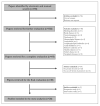A meta-analysis of potential risks of low levels of protein Z for diseases related to vascular thrombosis
- PMID: 20076855
- PMCID: PMC3692349
- DOI: 10.1160/TH09-09-0645
A meta-analysis of potential risks of low levels of protein Z for diseases related to vascular thrombosis
Abstract
The relationship between protein Z levels and thrombosis is controversial. We performed a systematic review and meta-analysis of the available studies to assess the association between protein Z and vascular thrombotic diseases. We conducted an electronic literature search through MedLine, Embase, Google Scholar, Web of Science, The Cochrane Library, bibliographies of retrieved articles and abstracts of congresses up to October, 2009. Studies were included if they analysed protein Z levels in patients with vascular thrombotic diseases. After the review process, 28 case-control studies (33 patient cohorts), including 4,218 patients with thrombotic diseases and 4,778 controls, were selected for analysis. The overall analysis using a random-effects model showed that low protein Z levels were associated with an increased risk of thrombosis (odds ratio [OR] 2.90, 95% confidence interval [CI] 2.05-4.12; p<0.00001). On subgroup analysis, a significant association was found between low protein Z levels and arterial vascular diseases (OR 2.67, 95%CI 1.60-4.48; p=0.0002), pregnancy complications (OR 4.17, 95%CI 2.31-7.52; p<0.00001), and venous thromboembolic diseases (OR 2.18, 95%CI 1.19-4.00; p=0.01). The results of this meta-analysis are consistent with a role for protein Z deficiency in thrombotic diseases, including arterial thrombosis, pregnancy complications and venous thromboembolism.
Figures






Similar articles
-
Antiplatelet and anticoagulant agents for primary prevention of thrombosis in individuals with antiphospholipid antibodies.Cochrane Database Syst Rev. 2018 Jul 13;7(7):CD012534. doi: 10.1002/14651858.CD012534.pub2. Cochrane Database Syst Rev. 2018. PMID: 30004572 Free PMC article.
-
Risk of thromboembolism in patients with COVID-19 who are using hormonal contraception.Cochrane Database Syst Rev. 2023 Jan 9;1(1):CD014908. doi: 10.1002/14651858.CD014908.pub2. Cochrane Database Syst Rev. 2023. Update in: Cochrane Database Syst Rev. 2023 May 15;5:CD014908. doi: 10.1002/14651858.CD014908.pub3. PMID: 36622724 Free PMC article. Updated.
-
Nutrition support in hospitalised adults at nutritional risk.Cochrane Database Syst Rev. 2017 May 19;5(5):CD011598. doi: 10.1002/14651858.CD011598.pub2. Cochrane Database Syst Rev. 2017. PMID: 28524930 Free PMC article.
-
Drugs for preventing postoperative nausea and vomiting in adults after general anaesthesia: a network meta-analysis.Cochrane Database Syst Rev. 2020 Oct 19;10(10):CD012859. doi: 10.1002/14651858.CD012859.pub2. Cochrane Database Syst Rev. 2020. PMID: 33075160 Free PMC article.
-
Screening for thrombophilia in high-risk situations: systematic review and cost-effectiveness analysis. The Thrombosis: Risk and Economic Assessment of Thrombophilia Screening (TREATS) study.Health Technol Assess. 2006 Apr;10(11):1-110. doi: 10.3310/hta10110. Health Technol Assess. 2006. PMID: 16595080
Cited by
-
A Pathway Proteomic Profile of Ischemic Stroke Survivors Reveals Innate Immune Dysfunction in Association with Mild Symptoms of Depression - A Pilot Study.Front Neurol. 2016 Jun 14;7:85. doi: 10.3389/fneur.2016.00085. eCollection 2016. Front Neurol. 2016. PMID: 27379006 Free PMC article.
-
Protein z exerts pro-angiogenic effects and upregulates CXCR4.PLoS One. 2014 Dec 4;9(12):e113554. doi: 10.1371/journal.pone.0113554. eCollection 2014. PLoS One. 2014. PMID: 25474349 Free PMC article.
-
Population-based study of blood biomarkers in prediction of subacute recurrent stroke.Stroke. 2014 Oct;45(10):2912-7. doi: 10.1161/STROKEAHA.114.005592. Epub 2014 Aug 26. Stroke. 2014. PMID: 25158774 Free PMC article.
-
Participation of protein Z-dependent protease inhibitor and protein Z system in the pathomechanism of thrombotic complications.Int J Angiol. 2010 Winter;19(4):e120-5. doi: 10.1055/s-0031-1278382. Int J Angiol. 2010. PMID: 22479141 Free PMC article.
-
Circulating protein Z concentration, PROZ variants, and unexplained cerebral infarction in young and middle-aged adults.Thromb Haemost. 2017 Jan 5;117(1):149-157. doi: 10.1160/TH16-04-0277. Epub 2016 Sep 29. Thromb Haemost. 2017. PMID: 27683756 Free PMC article.
References
-
- Ichinose A, Takeya H, Espling E, et al. Amino acid sequence of human protein Z, a vitamin K-dependent plasma glycoprotein. Biochem Biophys Res Comm. 1990;172:1139–1144. - PubMed
-
- Vasse M. Protein Z, a protein seeking a pathology. Thromb Haemost. 2008;100:548–556. - PubMed
-
- Vasse M, Guegan-Massardier E, Borg JY, et al. Frequency of protein Z deficiency in patients with ischaemic stroke. Lancet. 2001;357:933–934. - PubMed

